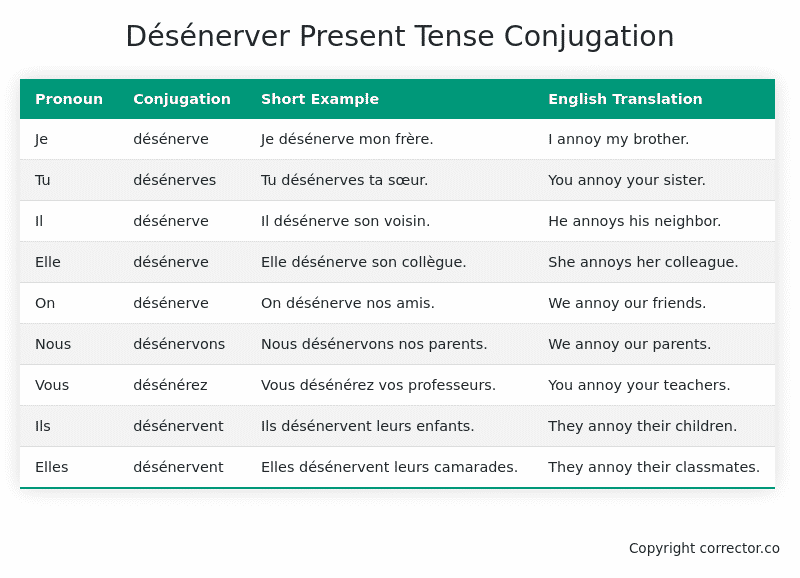Le Present (Present Tense) Conjugation of the French Verb désénerver
Introduction to the verb désénerver
The English translation of the French verb désénerver is “to calm down” or “to soothe”. The infinitive form “désénerver” is pronounced as “day-zay-nair-vay”.
The word “désénerver” is derived from the combination of the prefix “dés-” (meaning “un-” or “de-“) and the verb “énerver” (meaning “to irritate” or “to annoy”). It is often used in everyday French to describe the action of calming down or soothing someone or something that is irritated, agitated, or frustrated.
Here are three simple examples of its usage:
-
Je vais essayer de la désénerver après sa mauvaise journée.
(I will try to calm her down after her bad day.) -
Le bébé pleurait, mais sa mère a réussi à le désénerver en le berçant doucement.
(The baby was crying, but his mother managed to calm him down by rocking him gently.) -
Le professeur a utilisé de la musique apaisante pour désénerver la classe avant l’examen.
(The teacher used soothing music to calm down the class before the exam.)
Désénerver – About the French Present Tense
To take a deep dive into all the French tenses then see our article on Mastering French Tense Conjugation.
Common Everyday Usage Patterns For Le Present
Interactions with Other Tenses
Table of the Present Tense Conjugation of désénerver
| Pronoun | Conjugation | Short Example | English Translation |
|---|---|---|---|
| Je | désénerve | Je désénerve mon frère. | I annoy my brother. |
| Tu | désénerves | Tu désénerves ta sœur. | You annoy your sister. |
| Il | désénerve | Il désénerve son voisin. | He annoys his neighbor. |
| Elle | désénerve | Elle désénerve son collègue. | She annoys her colleague. |
| On | désénerve | On désénerve nos amis. | We annoy our friends. |
| Nous | désénervons | Nous désénervons nos parents. | We annoy our parents. |
| Vous | désénérez | Vous désénérez vos professeurs. | You annoy your teachers. |
| Ils | désénervent | Ils désénervent leurs enfants. | They annoy their children. |
| Elles | désénervent | Elles désénervent leurs camarades. | They annoy their classmates. |
Other Conjugations for Désénerver.
Le Present (Present Tense) Conjugation of the French Verb désénerver (You’re reading it right now!)
Imparfait (Imperfect) Tense Conjugation of the French Verb désénerver
Passé Simple (Simple Past) Tense Conjugation of the French Verb désénerver
Passé Composé (Present Perfect) Tense Conjugation of the French Verb désénerver
Futur Simple (Simple Future) Tense Conjugation of the French Verb désénerver
Futur Proche (Near Future) Tense Conjugation of the French Verb désénerver
Plus-que-parfait (Pluperfect) Tense Conjugation of the French Verb désénerver
Passé Antérieur (Past Anterior) Tense Conjugation of the French Verb désénerver
Futur Antérieur (Future Anterior) Tense Conjugation of the French Verb désénerver
Subjonctif Présent (Subjunctive Present) Tense Conjugation of the French Verb désénerver
Subjonctif Passé (Subjunctive Past) Tense Conjugation of the French Verb désénerver
Subjonctif Imparfait (Subjunctive Imperfect) Tense Conjugation of the French Verb désénerver
Subjonctif Plus-que-parfait (Subjunctive Pluperfect) Tense Conjugation of the French Verb désénerver
Conditionnel Présent (Conditional Present) Tense Conjugation of the French Verb désénerver
Conditionnel Passé (Conditional Past) Tense Conjugation of the French Verb désénerver
Conditionnel Passé II (Conditional Past II) Tense Conjugation of the French Verb désénerver
L’impératif Présent (Imperative Present) Tense Conjugation of the French Verb désénerver
L’impératif Passé (Imperative Past) Tense Conjugation of the French Verb désénerver
L’infinitif Présent (Infinitive Present) Tense Conjugation of the French Verb désénerver
L’infinitif Passé (Infinitive Past) Tense Conjugation of the French Verb désénerver
Le Participe Présent (Present Participle) Tense Conjugation of the French Verb désénerver
Le Participe Passé (Past Participle) Tense Conjugation of the French Verb désénerver
Struggling with French verbs or the language in general? Why not use our free French Grammar Checker – no registration required!
Get a FREE Download Study Sheet of this Conjugation 🔥
Simply right click the image below, click “save image” and get your free reference for the désénerver present tense conjugation!

I hope you enjoyed this article on the verb désénerver. Still in a learning mood? Check out another TOTALLY random French verb present conjugation!


